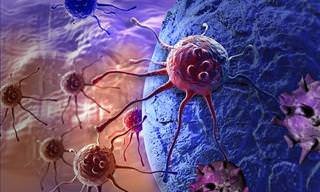A study which attempted to show that viruses could be delivered to brain tumors has delivered that and more.
Not only did the particular virus in question reach its target, but it also stimulated the patient's own immune system - which then went on to attack the tumor as well.
Pre-clinical trials in mice, followed by window-of-opportunity trials in nine human patients, showed that this naturally occurring virus offers potential for a new type of cancer therapy that could be used alongside other treatments.
The virus that they used is one that has previously shown potential for cancer treatment. It's called the mammalian orthoreovirus type 3, and it has already been shown to kill tumor cells, but leave healthy cells alone.
Previous experiments have demonstrated this, but the researchers from the University of Leeds are the first to successfully direct it at brain tumors. This is because, until now, it was thought unlikely that it was possible that the virus could cross the blood-brain barrier - a membrane that protects the brain from pathogens.
Co-lead author Adel Samson says that "this is the first time it has been shown that a therapeutic virus is able to pass through the brain-blood barrier, and that opens up the possibility that this type of immunotherapy could be used to treat more people with aggressive brain cancers."
Nine patients were selected to be injected with the virus. All either had brain tumors that had spread to other parts of the body, or fast-growing gliomas - a type of brain tumor that is hard to treat and has a poor prognosis. All were scheduled to have their brain tumors surgically removed following the reovirus experiment.
The researchers took samples from the tumors after they had been removed, and compared them to the tumors of patients who had had brain surgery, but not the reovirus beforehand. They found the virus in the tumor samples of the trial patients, clearly proving that the virus had been able to reach the cancer.
However, they also found an increased level of interferons, the proteins that activate our immune system. They team says that these interferons were attracting white blood cells to the site to fight the tumor.
Co-lead author Alan Melcher says that "our immune systems aren't very good at seeing cancers - partly because cancer cells look like our body's own cells, and partly because cancers are good at telling immune cells to turn a blind eye. But the immune system is very good at seeing viruses. In our study, we were able to show that reovirus could infect cancer cells in the brain. And, importantly, brain tumors infected with reovirus became much more visible to the immune system."
These findings are now being applied in a clinical trial, where patients are being given the reovirus treatment in addition to chemotherapy and radiotherapy. One patient's treatment is already underway - he is being given 16 doses of the reovirus to treat his gliobastoma.
The reason why he is being given multiple doses is because of the way the virus activates the immune system. This clinical trial will determine how well cancer patients can tolerate the treatment, since the virus can cause flu-like symptoms, and whether it makes the standard treatment more effective.
Oncologist Susan Short, who is also leading the clinical trial, says that "the presence of cancer in the brain dampers the body's own immune system. The presence of the reovirus counteracts this and stimulates the defence system into action. Our hope is that the additional effect of the virus on enhancing the body's immune response to the tumor will increase the amount of tumor cells that are killed by the standard treatment, radiotherapy and chemotherapy."
Source: sciencealert
Image: depositphotos
 Go to BabaMail
Go to BabaMail






















































